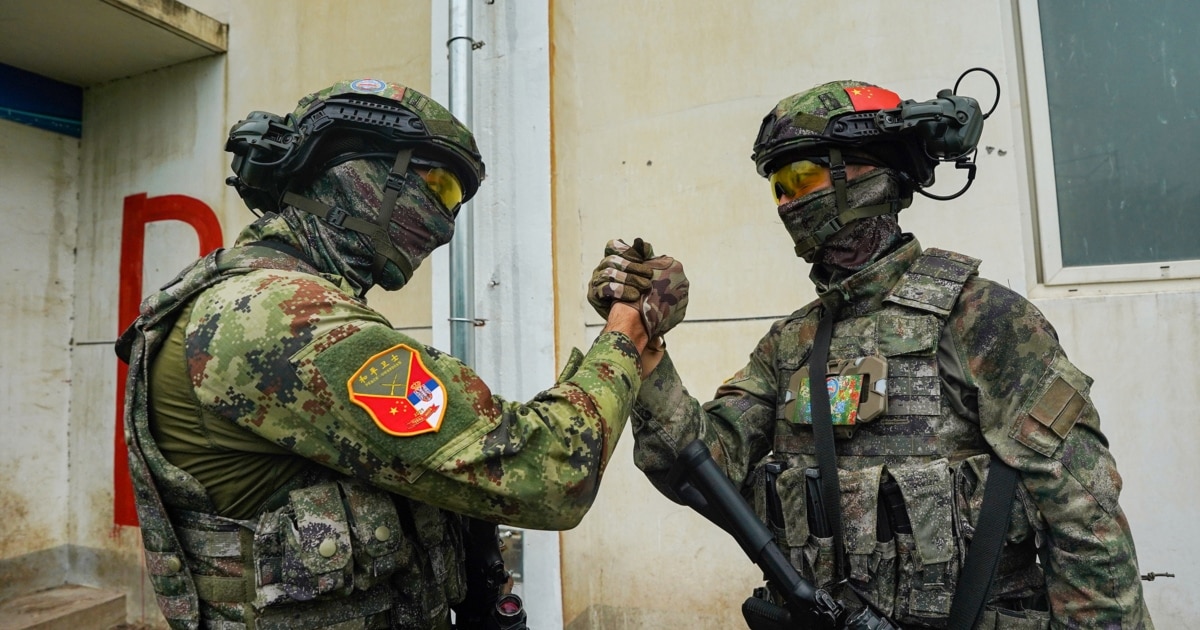A Serbian military special operations brigade has completed joint training with a Chinese brigade in China despite strong objections from the European Union and the United States.
The joint training ran from July 19-28 and took place in Hebei Province in northern China as Serbia, a candidate country for EU accession, tries to balance its European integration while maintaining close ties with Beijing and Moscow.
“The training provided a boost to military cooperation and enhanced the interoperability of combat teams in executing missions alongside foreign armed forces and in international environments,” Serbia’s Foreign Affairs Ministry said.
Serbia’s Ministry of Defense said the joint training, which was announced two weeks ago, involved mixed combat teams rehearsing tactical missions in both urban and rural settings supported by unmanned platforms.
“The focus was on drone tactics in special forces operations, and the activities also included firearms, tactical, and mountaineering training,” the ministry said in a statement.
It was the first joint military training between the two countries and the first between China and an EU candidate country.
In recent years, Serbia has expanded its military cooperation with China, including the purchase of Chinese weaponry such as the FK-3 air defense system.
Serbia’s friendly policies toward Beijing have drawn a negative reaction from Brussels, which has issued multiple warnings to Belgrade.
An EU spokesperson told RFE/RL earlier this month after the latest exercise, dubbed Peacekeeper 2025, that the bloc wants to know it can count on Serbia as a reliable European partner committed to common principles, values, and security.
“We need Serbia to assure us of its strategic orientation,” the spokesperson said.
As a candidate country, Serbia is obliged to align its foreign policy with that of the EU, which Brussels has repeatedly brought to Belgrade’s attention.
Though Serbia maintains military neutrality it is a member of NATO’s Partnership for Peace program, and its strategic goal remains EU accession.
However, Belgrade continues to balance its foreign policy between the West, China, and Russia, which is currently under Western sanctions due to its invasion of Ukraine.
Security analyst Nikola Lunic earlier this month warned that these joint drills “undermine Serbia’s proclaimed EU orientation.”
Lunic told RFE/RL that “interoperability between Serbian and Chinese units sends a clear message to the West.”
Brussels and Washington have repeatedly expressed concern about Serbia’s arms purchases from Russia and China, especially since Russia’s full-scale invasion of Ukraine in February 2022.
Serbia purchased the FK-3 air defense system in 2022, two years after buying six new CH-92A drones from China. This made Serbia the first European operator of these Chinese missiles and combat drones.
During a military equipment showcase in April 2023, Serbia unveiled the new Chinese CH-95 drone to the public.
From Belgrade’s perspective, this deepening cooperation is consistent with its “multi-vector” foreign policy, using partnerships with diverse global actors to maximize its leverage and independence on the world stage, said Vuk Vuksanovic of the Belgrade Centre for Security Policy.
Vuksanovic pointed to the Global Security Initiative, highlighting increased military and police education exchanges and the rapid adoption of Chinese technology, surveillance, and police equipment by Serbia.
Exercises such as Peacekeeper 2025 serve two key interests, according to Vuksanovic. They help Serbia gain international operations experience and boost its profile as a major power, especially given resistance from EU states against deepening partnerships with the Chinese military.
